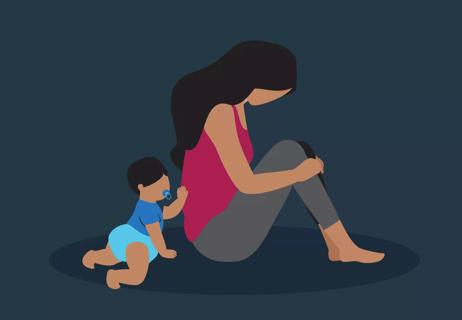Sad feelings and teariness that persist are a sign

Becoming a parent should be one of the happiest occasions of your life. Not only is it a physical relief to have finally given birth, but having a child is an emotional joy as well.
Advertisement
Cleveland Clinic is a non-profit academic medical center. Advertising on our site helps support our mission. We do not endorse non-Cleveland Clinic products or services. Policy
Yet in the weeks after you give birth, you might not feel as overly excited as you expected. Instead, you might feel down in the dumps or burst into tears at a moment’s notice.
This behavior might be bewildering. After all, it’s certainly not because of the very cute baby you’re now taking care of. So, what’s going on?
In the first few weeks after giving birth, you might feel teary or sad for no reason. Rest assured that you’re not alone — you’re experiencing the postpartum blues, better known as the baby blues.
“This is very, very common,” says Ob/Gyn Erica Newlin, MD. “The statistics usually cited are around 70% to 80% of women report feelings of sadness or teariness after delivery.”
Despite being so widespread, new parents typically don’t expect to feel the baby blues. However, it’s easy to feel sad and out of sorts. After all, you have a lot of changes going on all at once — stressful changes — and you’re likely not sleeping as much as you’re used to.
“The baby blues can be affected by lack of sleep, stress and hormonal changes,” Dr. Newlin confirms. “So, if you’re feeling that way, know that you are not alone and that it is very normal.”
The biggest difference between the baby blues and postpartum depression comes down to severity and length of time.
Advertisement
Baby blues tend to peak in that first week after delivery and resolve in those first two weeks.
“If your symptoms are persisting past those first couple weeks, and if you feel like things aren’t getting better, that’s a reason to call your doctor,” says Dr. Newlin. “Or if things are escalating and you feel like it’s affecting your ability to care for yourself, or to care for your baby, call your doctor.”
Again, it’s really common to feel teary or to feel sad for no real reason. But if these feelings become so intense that they’re interfering with your day-to-day life, there could be something more going on, says Dr. Newlin.
“If you find you’re no longer able to take joy in the things that you used to, or you’re feeling worthless or hopeless, or if it’s affecting your ability to care for your baby or to care for yourself,” she continues, “say you can’t get out of bed in the morning, or you’re not able to eat, or you’re eating too much — those can all be more depression than the baby blues.”
Even though you’re tired and stressed, you should feel some joy and happiness during the postpartum period. If you don’t, that’s a warning sign.
“You’ve internalized those feelings of hopelessness and worthlessness, and you’re not able to enjoy anything about that postpartum period,” says Dr. Newlin. “That is more consistent with depression than baby blues, and is definitely a reason to reach out.”
Luckily, the baby blues are temporary and pass after a few weeks. In the moment, however, these emotions can be intense and frustrating. Here are some ways to cope:
You might feel embarrassed or guilty that you’re feeling anything but ecstatic after giving birth. You’re not alone in feeling that way, reiterates Dr. Newlin.
“Many women suffer in silence because they are worried about being judged or they’re worried that they really shouldn’t be feeling these feelings,” she explains. “But it’s not your fault. It’s not that you’re a bad mom. It’s not that you don’t love your baby. No one is going to think any of those things.”
If you think you’re dealing with the baby blues, it’s OK to call your doctor and talk about your symptoms. Dr. Newlin says the initial post-delivery teariness and sadness that comes with the baby blues are short-lived, but can be surprisingly intense.
But keep an eye on how you’re feeling. “If you’re worried about something to the point where it’s affecting your sleep or you’re having these racing thoughts, those aren’t normal, and definitely a reason to reach out to us,” says Dr. Newlin. “If these feelings persist beyond the first few weeks, or if you find that it’s affecting your appetite and your ability to function, that’s also a cue to reach out.”
Advertisement
The baby blues and postpartum depression (as well as postpartum anxiety) are treatable. It’s common for new parents to see counselors, join a support group or even take medication.
“It’s really worth seeking care because there are things that we can do to help,” reassures Dr. Newlin. “And we’re not here to judge you. We really want to help. You never need to feel embarrassed, because we really want to be there to help, and to intervene, and to get you through this time.”
Advertisement
Learn more about our editorial process.
Advertisement

Heavy bleeding, pain and persistent sadness could be something more serious

What to know, and when to seek help

It's the first medicine approved for this use

Bleeding is a risk and warrants taking care, but the reward of this lifesaving medication is great

Severe and debilitating headaches can affect the quality of your child’s life

Type 2 diabetes isn’t inevitable with these dietary changes

Applying a hot or cold compress can help with pain